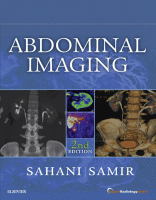Physical Address
304 North Cardinal St.
Dorchester Center, MA 02124

Diffuse gallbladder wall thickening is commonly encountered in diagnostic settings. The ability of ultrasonography, computed tomography (CT), and magnetic resonance imaging (MRI) to directly visualize the thickened gallbladder wall ascertains the importance of this condition. Ultrasound is the initial imaging…

Etiology The exact pathogenesis of bile duct carcinoma has not been described, but predisposing factors are similar to those causing intrahepatic bile duct neoplasms. It is believed that long-standing inflammation causes metaplasia and, finally, carcinogenesis. Prevalence and Epidemiology Tumors of…

Etiology The exact pathogenesis of bile duct carcinoma has not been described, but predisposing factors include long-standing inflammation, parasitic infestation, toxin and drug exposures, and genetic abnormalities. It is believed that repeated inflammation leads to chronic bile duct injury with…

Etiology The precise cause of gallbladder carcinoma is unknown, but cholelithiasis and pancreaticobiliary malformations are major risk factors. Gallstones and reflux of pancreaticobiliary enzymes are thought to result in chronic repetitive inflammation of the gallbladder mucosa that, over time, may…

Etiology Biliary dilatation can occur as a result of biliary obstruction, from an altered functional state (e.g., after cholecystectomy or with sphincter of Oddi dysfunction), or uncommonly as a result of a choledochal cyst. The role of imaging is to…

General Considerations Diffuse involvement of the pancreas can occur with various inflammatory, infective, infiltrative, or neoplastic disorders. Any pathologic process that involves the pancreas focally also can cause diffuse involvement ( Box 51-1 ). More common causes of diffuse pancreatic…

Autoimmune Pancreatitis Etiology Autoimmune pancreatitis (AIP) is a peculiar form of chronic pancreatitis characterized by a fibroinflammatory process involving multiple organs with characteristic histopathologic and serologic features, association with other autoimmune disorders, and a propensity to respond to corticosteroid therapy…

Etiology Chronic pancreatitis is defined as an ongoing prolonged inflammatory disease characterized by progressive irreversible structural changes resulting in permanent loss of endocrine and exocrine function. The Cambridge classification of 1983 acknowledged that chronic pancreatitis is typically associated with abdominal…

Etiology Acute pancreatitis is an acute inflammatory disorder of the pancreas that has numerous causes ( Box 48-1 ). The most common risk factors are chronic alcohol consumption and choledocholithiasis. In 20% of cases no cause can be found. Box…

Etiology Cystic lesions of the pancreas encompass a wide spectrum of different pathologic entities, ranging from developmental, to inflammatory, to neoplastic cysts. Neoplastic cystic lesions, which are the most important, owing to their profound impact on patient prognosis and the…